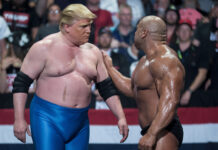Chicago, Il — In what many pedants are calling unacceptable, the Modern Language Association (MLA) and the American Psychological Association (APA) failed to reach an agreement late last night on how to properly cite the novel coronavirus (MLA) or COVID-19 (APA). The battle between the two influential organizations has been raging since late January when each often offered contradictory citation guidelines to combat the pandemic.
This is not the first time the style guides have clashed. The two organizations have been battling for over 45 years, culminating in a famous MTV Celebrity Deathmatch in the late 1990s to determine which format was superior. The match ended in a draw with the MLA parenthetically ripping off the APA’s cover page, and the APA humiliating the MLA’s use of its last name on its forehead.
The APA manual (published by the American Psychological Association) is mostly used in social science and education fields. The MLA Handbook (published by the Modern Language Association) is mainly used in humanities fields.
“This is a serious problem for scholars, academics, scientists and of course confused college freshmen,” said James Badwater of the University of Chicago’s Badwater Institute for Rhetoric and Transformational Grammar. “It’s bad enough that no one is going to know how to cite this pandemic, but think about how confused freshmen are going to be.”
Because of the dispute, over 17 research institutions plan on halting research until resolved. According to observers, this could have a dramatic impact on novel coronavirus/COVID-19 research. Complicating matters, both the New York Times and the Los Angeles Times say they will alter their reporting to accommodate the ambiguity, with the NY Times saying they will refer to the virus as ‘It’ “until the MLA and APA get their acts together.” The LA Times said it would refer to the virus as “Harrold.”
When news of what’s being now called “the style guide workshop” reached the White House, President Trump immediately blamed the Chinese and said testing would soon be available to resolve the conflict.
Spokespeople for both organizations say they have no plans to reach out to the other, but maintain that they are open to negotiation, someday.






